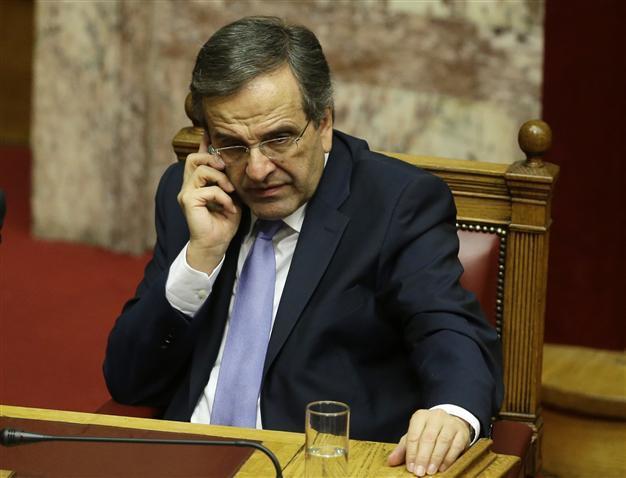Greece reels over early presidential vote
ATHENS - Agence France-Presse

The election is a key test for embattled Prime Minister Antonis Samaras, who would be forced to call snap general elections if his candidate -- former EU Environment Commissioner Stavros Dimas -- fails to garner enough support. AP Photo
Greek stocks plunged Dec. 9 on fears of a political stalemate after the government unexpectedly brought forward a high-stakes presidential election.The vote by 300 members of parliament to replace President Karolos Papoulias was due in February but a first round has now been set for December 17.
The election is a key test for embattled Prime Minister Antonis Samaras, who would be forced to call snap general elections if his candidate -- former EU Environment Commissioner Stavros Dimas -- fails to garner enough support.
The PM said he had brought forward the election to clear "clouds of political instability in Greece and political uncertainty over Greece abroad."
He added that Dimas, 73, is "respected by the international community" and his election would enable Greece to "officially enter the post-bailout era."
But news of the early vote sent stocks plunging, with losses accelerating after Dimas was formally named as the government's candidate.
The Athens overall index, which was down 6 percent at open, lost over 10.0 percent to 923 points after midday.
Analysts warned that the political uncertainty could stall Greece's fiscal reforms which are required under the terms of a 240-billion-euro ($295-billion) bailout package accorded by the European Union and the International Monetary Fund.
Greece is only gingerly creeping out of a debilitating recession that lasted six years and which left about a fifth of the population unemployed.
Tensions are still running high with many Greeks fed up with years of austerity, and Athens is still locked in negotiations with its creditors for the final tranche of EU aid funds.
"A Greek accident remains a potent risk...the risk of a political backlash and reform reversal is thus very real for now," analysts Berenberg said in a note.
Unsettled investors dumped shares in top banks, with stocks in the four leading lenders -- National Bank, Piraeus Bank, Alpha Bank and Eurobank -- losing between 10 and 12 percent.
The yield of ten-year Greek government bonds also jumped to 7.8 percent from 7.24 percent on Monday.
Samaras has a narrow majority of 155 seats, and his candidate is therefore unlikely to secure an outright win in the first round.
A second and third round are scheduled for December 23 and 29, but the bar for a win lowers in the final round -- with 180 votes needed.
"In our view, it is highly uncertain whether the current government can achieve this level of support," said Citi European Economics.
Failing victory, Samaras would have to call a snap general election at a time when polls indicate radical left party Syriza -- which has pledged to reverse many of the reforms imposed by the country's EU-IMF creditors -- leads opinion polls.
An early general ballot in February would be Greece's second in less than two years.
In 2012, back-to-back elections were needed in May and June to form a shaky coalition government, stalling Greece's fiscal reforms and sparking speculation that the country was about to be ejected from the euro.
"Election talk has always been bad for the market," Vassilis Korkidis, head of the confederation of Greek commerce, told To Vima radio.
"Nobody knows what Syriza would do in power...that uncertainty would weigh heavily on markets," noted Hamburg-based Berenberg.
The move -- described by most analysts as a gamble for Samaras -- came as Greece brokered a two-month extension from eurozone ministers to its multi-billion bailout programme.
Greece has set its sights on a new credit line, but this would require the existing bailout to be completed or terminated, and with talks between the government and the creditors still ongoing, this seemed unlikely before the December 31 deadline.
The latest budget, passed on Sunday, forecasts 2.9 percent growth and a deficit of 0.2 percent but the 'troika' of creditors -- the EU, IMF and the European Central Bank -- regard these estimates as overly optimistic.
At issue is the fifth and final review of Greece's current bailout, which would be the last 1.8 billion euro instalment from the eurozone.
"If (Samaras) can get the political uncertainty out of the way in December, the outlook for the Greek economy for 2015 would improve," Berenberg said.
















